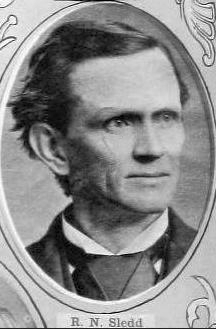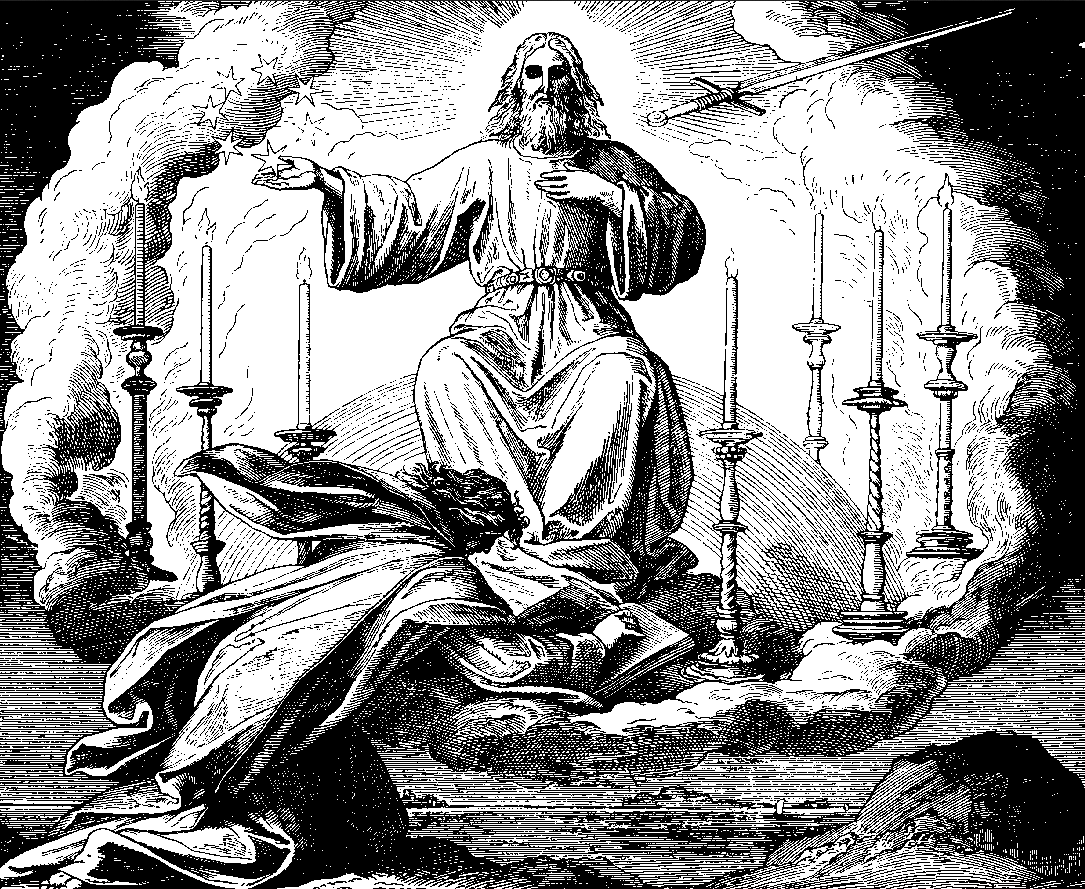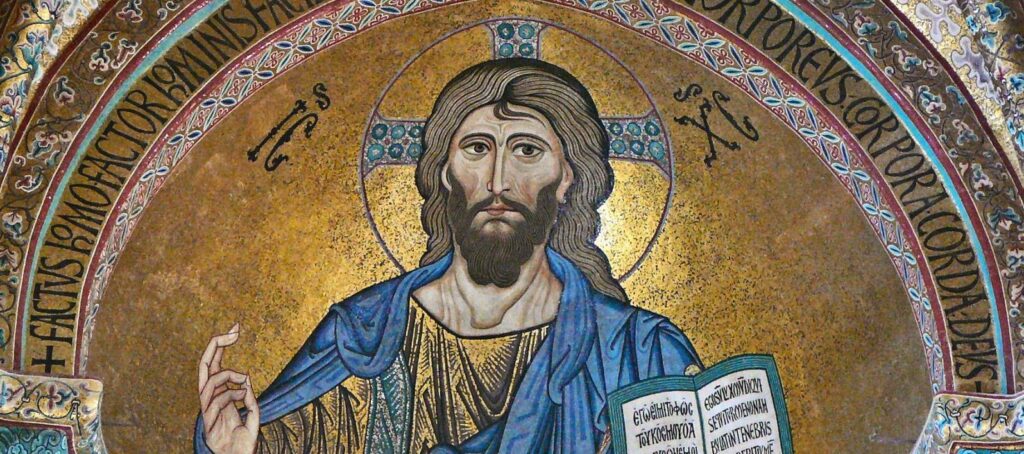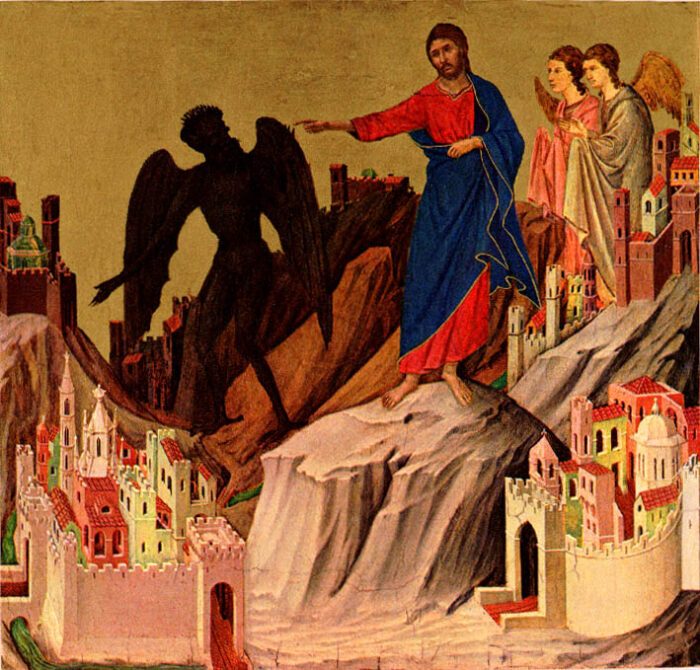Editor’s note: The following is extracted from True Heroism and Other Sermons, by R. N. Sledd (published 1899).
“And when I saw Him, I fell at His feet as dead. And He laid His right hand upon me, saying unto me, ‘Fear not; I am the first and the last: I am He that liveth and was dead, and behold I am alive forevermore, Amen; And have the keys of hell and of death.’” – Rev. i , 17, 18.
John was on the isle of Patmos, an exile “for the word of God, and for the testimony of Jesus Christ.” On a certain Lord’s day, in a peculiar sense, he “was in the Spirit:” in a spiritual state differing, perhaps, both in degree and in kind, from the ordinary frame of faithful men; a state of rapture or ecstasy in which he was transported out of himself and brought into direct contact with the sublime realities of the spiritual world. The special purpose of God in bringing His servant into this condition of extraordinary spiritual elevation was to prepare him to receive and record those wonderful revelations, which were about to be made of the divine plans and movements in the administration of the affairs of the church, and of the world.
While in this state, he heard behind him “a great voice, as of a trumpet,” saying, “I am Alpha and Omega, the first and the last,” and bidding him write in a book what he saw, and send it to the seven churches. Turning to see whence came the voice, he “saw seven golden candlesticks, and in the midst of the candlesticks one like unto the Son of Man, clothed with a garment down to the foot, and girt about the paps with a golden girdle. His head and His hairs were white like wool, as white as snow; and His eyes were as a flame of fire, and His feet were like unto fine brass, as if they burned in a furnace; and His voice as the sound of many waters. And He had in His right hand seven stars; and out of His mouth went a sharp two-edged sword; and His countenance was as the sun shineth in his strength.”
What a change had taken place in the Son of Man since John last saw Him! He had known Him intimately on earth. He had been admitted to the innermost circle of His confidence and love. He had seen Him in His humiliation, sorrow, suffering and death; but also in His exultation and joy, in the splendor of His transfiguration, and in the triumph of His resurrection and ascension. But so marvelous had been the change, that John, while recognizing Him as the beloved Master, whom he had known on earth, could not endure this vision of His majesty. Overpowered by amazement and terror he “fell at his feet as dead.” Gently laying His right hand upon His prostrate disciple, with a tenderness that, no doubt, waked up precious memories of the loving fellowships of the past, he said, “Fear not; I am the first and the last; I am He that liveth and was dead; and, behold I am alive forevermore, Amen , and have the keys of hell and of death.”
It was no real danger that John feared. It was the personal glory of his own Redeemer, the vision of His matchless majesty, that filled him with alarm the very thing that of all others was his surest defence, and, when rightly interpreted, his great joy. This is the lesson of the text for God’s servants in all ages: The majesty of Christ is the true antidote for our fears, and the sure ground of our comfort and confidence. His majesty is seen:
I. In the divine dignity of His nature. “I am the first and the last.” This expression is used three times by Isaiah, and three times by John. By Isaiah it is used in application to the Lord Jehovah; by John in application to Jesus Christ. The Lord Jehovah of Isaiah is the Jesus Christ of John. The expression denotes absolute Godhead. From everlasting to everlasting, Jesus Christ is God. All creation comes forth from Him, and exists by the word of His power and for His glory; for “all things were made by Him and for Him; and He is before all things and by Him all things consist.” The author of all being, material, sentient, and moral, He is the author of all the laws of being. All the forces of the universe are in His hands; for “He is head of all things.” Those mighty convulsions of nature and those dire disasters of empires that cause the hearts of men to fail and their cheeks to grow pale with dismay, are but the utterances of His voice and the tread of His burning feet. But He is “head over all things to the church.” His divine power, wisdom and goodness are wielding all their resources in the interest of the church — for its security, its discipline, and its purification — that He may present it unto Himself at last “a glorious church, not having spot, or wrinkle, or any such thing; but that it should be holy and without blemish.”
The idea of His essential divinity is conveyed also in the expression, “I am He that liveth,” or more correctly, “and the living one.” This clause is directly connected with that which precedes; “I am the first and the last, and the living one.” It does not mean simply that He was alive, but that He had life in Himself. John said of Him, “in Him was life,” and He said of Himself, “I am the life,” and, “as the Father hath life in Himself; so hath He given to the Son to have life in Himself,” that is independently, absolutely. The fullness of life, all life, is in Him and from Him; and all moral beings have their true life, and attain their true end, only in Him. For no being less than the eternal God can such a prerogative be claimed.
Thus is laid broadly and deeply, on the rock of the absolute deity of Christ, the foundation of our faith and hope. From this rock flows an exhaustless stream of comfort and holy joy. Were He less than divine, we might well tremble in anticipation of the utter wreck of our spiritual fortunes. But with “the first and the last , and the living one” as our refuge, we need not fear “though the earth be removed, and the mountains be cast into the midst of the sea.”
II. In His mediatorial work. “And I became dead, and, behold, I am alive forevermore.” As “the Living One,” before His incarnation, He was, in an important sense, a Meditator. It was through Him that God the Father manifested Himself. We have no evidence that He ever revealed Himself in any creative, providential, or gracious act, except through the eternal Son, or that He will ever do so in the ages to come.
On the other hand, we have scriptural proof that the first movement of His infinite energies was made through the Son, that in and through Him he first gave formal expression to His power, wisdom and goodness in creation, and that by Him He keeps in operation all the wondrous machinery of the universe. Mediation, therefore, seems to have entered into the divine purpose and plan from the beginning. It is the law of the divine self-manifestation. It will continue after redemption shall have become a finished chapter in the history of the divine administration. As glorified God-man, the the Son will forever be the Revealer of the glory, the Executor of the will, the Dispenser of the benefactions of the Father to all finite intelligences. But in the case of man as fallen, issues hitherto unknown in the divine government are involved. Sin has entered not merely as a disturbing element, but as an active revolutionary and destructive force. It has subverted the normal order of man’s being; it has disordered and dislocated his powers; it has jostled him out of his place in God’s system. It has put man in a position of open hostility towards God. It has opened between him and his Maker a gulf as deep as hell and as black as outer darkness. On yonder side is God, who is of too pure eyes to behold iniquity and cannot look upon sin. On this side is man, who is of too impure eyes to behold good and cannot look upon holiness. Hating purity and loving sin, his chosen pathway is leading him at every step into deeper darkness, into fouler pollutions, more aggravated guilt, and more dreadful perils.
The earthly father detests the vice that is destroying his son; yet he loves the son and would make any sacrifice to restore him to the path of virtue. So the Heavenly Father, while hating sin, loves His sinning creature, and would rescue him from death and restore him to purity and happiness. But how can He reach him? How can He make known to him the love and yearning of His heart? How can He from the infinite height of His glory enter into communion with the fallen and recover their love and allegiance?
The eternal word becomes the messenger of His grace — not now, however, as the eternal word, but as the man Christ Jesus. “The word was made flesh;” “God was manifest in the flesh.” He did not, could not, divest Himself of any attribute of divinity, nor did He superadd in the constitution of His person, any quality that did not pertain to humanity as originally constituted. All that belongs to the divine nature becomes one with all that belongs to human nature, “so that two whole and perfect natures were joined together in one person, never to be divided, whereof is one Christ, very God and very man.” Veiling the glory of the Divine in the human, as a man he comes to men. He enters into their homes, sits with them at their hearthstones, reclines with them at their tables, walks with them on the highway, by the seashore, in the fields, always and everywhere telling them of his Father and their Father, of the love that yearns over them, of the arms that are open to receive them, and of the fellowship divine that awaits them.
It was a strange story. No wonder that men were astonished at His doctrine, and questioned His authority. To all such questioning his reply was: “If I do not the works of my Father believe me not, but if I do, though ye believe not me, believe the works, that ye may know and believe that the Father is in me, and I in Him.” By a character that was spotless and a life that was blameless and by works which no man could do “except God be with Him,” He demonstrated that He came from the Father as a bearer of a message of love with offers and conditions and peace.
But all that was not enough. Clear as was the revelation of the divine character and good will to men in His life and doctrine, it did not meet all the necessities of the case. If His mediation stopped at this point it would prove a disastrous failure. In its revelation of God, it has revealed also the completeness and the terribleness of man’s ruin, and awaking in him the desire of better things, if it provides no means for their attainment, it only intensifies his despair. Hence, while Christ said His mission was to “bear witness to the truth,” He declared, also, the necessity of His suffering and death. The forgiveness of sin and the regeneration of the soul by the power of the Holy Ghost are essential to restored friendship between God and man; and it is only in His “blood that we have redemption, even the forgiveness of sins, according to the riches of His grace.” To shed His blood, to die, not as a martyr, not as an example of heroic endurance, but as a vicarious sacrifice for the sins of the world, in vindication of the divine character and government, and to make it possible for God to be just and yet justify and save the sinner, was the prime object of His mission to earth. Not His life, so beautiful in its simplicity and purity, so glorious in its devotion to the highest and holiest interests of humanity, but His death of shame, and agony, and desolation, is the central fact of revelation. Before the foundations of the world were laid He was looking forward to it. From the summit of His glory, He recalls it: “I am He that was dead.” In all the ages of human history that went before, the index finger of inspiration was pointing forward to the cross. In all the ages that have followed, apostles, prophets, evangelists, pastors and teachers, have been pointing the world back to it. The merit, the redeeming power of that death can be measured only by the infinite dignity of His person.
“Lord, I believe were sinners more
Than sands upon the ocean shore,
Thou hast for all a ransom paid,
For all a full atonement made.”
But this does not complete the work of amazing love. From the cross He goes to the grave. To the imperfect faith of the disciples, all seemed to be lost when He died. “We trusted,” said they, “that it had been He that should redeem Israel.” But their trust seemed to be disappointed, and their hopes doomed to extinction. And truly all is lost if He rise not. But God hath raised Him up, “having loosed the pains of death; because it was not possible that He should be holden of it.” And “He was seen of Cephas, then of the twelve; after that He was seen of above five hundred brethren at once. After that He was seen of James; then of all the apostles. And last of all He was seen of Paul also, as of one born out of due time.” And after having been seen of them forty days, “He led them out as far as Bethany, and He lifted up his hands and blessed them. And it came to pass, while He blessed them, He was parted from them, and carried up into heaven. “Having been delivered for our offenses,” and “raised again for our justification,” He has gone into heaven, there “to appear in the presence of God for us.” For us from first to last; incarnate, suffering, dying, rising, ascending, interceding, all for us!
“O Love, thou bottomless abyss!
My sins are swallowed up in thee;
Covered is my unrighteousness,
Nor spot of guilt remains on me,
While Jesus’ blood, through earth and skies,
Mercy, free, boundless mercy cries.”
And now He says, “Behold, I am alive forevermore, Amen.” Before His incarnation, He was the Living One, but as absolute God; again He is the Living One, but as God-man. He has taken our humanity up into the glory He had with the Father before the world was; and in His dual nature, not only lives, but is the fountain of all the spiritual life of our race. Life goes out from Him, through the gospel, to all the earth. To feel its wondrous thrill, one has only to believe the gospel. Simple condition! Glorious result! And as He is alive forevermore, the stream of life shall flow on forever. It shall find its way into every wilderness and solitary place; “and the desert shall rejoice and blossom as the rose. It shall blossom abundantly, and rejoice even with joy and singing.” The purpose of His grace thus accomplished, He will take His redeemed up into His glory, and in Him and with Him they, too, shall have life forevermore.
III. In His dominion over death and the grave. “And have the keys of hell and of death.” The key, among the ancients, was a symbol of power and authority. “The key of the house of David will I lay upon Eliakim’s shoulder; so he shall open, and none shall shut: and he shall shut, and none shall open.” He shall be grand master of the king’s household, chancellor of the exchequer, and prime minister of state, second in authority only to the king himself. Christ uses the same figure on the occasion of Peter’s memorable confession: “I will give unto thee the keys of the kingdom of heaven;” that is, “Thou shall have the authority to open the door of faith to the world; thou shall be the first to preach the gospel to both Jews and Gentiles.” This Peter did on the day of Pentecost, and afterwards in the house of Cornelius. It is written of Christ, He “hath the key of David.” David was supreme in the kingdom of Israel, so Christ is supreme in the kingdom of heaven. “The sure mercies of David,” all the treasures of grace and of glory are at His disposal. So when He says, “I have the keys of hell and of death,” He asserts His authority over the spirit world, and his power to abolish death, and “destroy him that hath the power of death, that is the devil.”
Hell, in this place, does not denote the place of the punishment of the finally impenitent, but that invisible state into which the good and bad alike enter on the death of the body; or it may mean simply the grave. It is conceived of as a prison in which all the departed are confined. It is a place of utter darkness and silence. Its walls and towers are built of darkness. Its doors and their bars and bolts are all made of darkness. Its halls, its beds, its cells, its chains are of darkness. It is a darkness so dense that no light of human reason can penetrate it, or discover any of the secrets which it hides. It is as silent as it is dark. No voice of mirth or of woe, no clank of chain or note of joy, not the faintest whisper or lightest footfall breaks for an instant its dreadful silence. The thunder of battle or the wild shriek and crash of the tempest around its walls, or the convulsive groans of the earth in her mighty throes, cannot wake the feeblest echo. Our dear ones die; they go into the darkness and silence. We call, but they answer not; we weep and lament, but no voice of sympathy comes back to soothe our sorrow and heal our hearts. They may be happy or they may be miserable, they tell us not. They may remember and love us still; but they give us no token. We, too, shall be brought to death and to this “house appointed for all the living.” The blackness shall enshroud us and the seal of silence be put on our lips. But with this precious word in our hands, and in our hearts, we go into the darkness with sure and certain hope. “I have the keys,” says our glorious Redeemer. When He came forth from the grave He wrested the keys from the prince of darkness, and ever since has worn them at His girdle in token of His triumph, and of the coming deliverance of His imprisoned loved ones. And when the fullness of time shall come, He “shall be revealed from heaven with his mighty angels;” and approaching the old prison-house and thrusting the key into its socket, with one movement of His hand the bolts shall fly back and the doors open. With one flash of His glory the darkness shall be scattered, and at one word of command the mighty host of the dead shall come forth. The sceptre of “the grim monster” shall drop from his hand, his throne shall crumble into ruin beneath him, and “death shall be swallowed up in victory.” The last enemy destroyed, the conflict of the ages is ended, and the redeemed of the Lord shall celebrate the triumph in “the song of Moses, and of the Lamb.”
In conclusion, what wealth of comfort there is in these views of our Redeemer and King! While in reverent awe we hide our faces from the vision of His majesty, in that majesty we find the pledge of our security and glory. Is He divine? Then all that divinity implies is on our side. Is His atonement unlimited and complete? Then is there deliverance for us from all the guilt, and power, and pollution of sin, renewal after His own image, adoption into His family and all the high privileges and hopes of sons and daughters of the Lord Almighty. Is He the conqueror of death? He conquered for us, and because He lives we shall live also. And if He, with the riches of His divine power, and wisdom, and goodness, and the fullness of His redeeming grace, be for us, who can be against us? The consciousness of imperfection of character and obliquities of life may oppress us; the hardness of life’s discipline, and our fierce conflict with corruption and temptation may fill us with anxious fears; the mystery of His dispensations to nations and men, the withering of our sweetest hopes, the desolation of our homes, and the breaking of our hearts, may often fill us with dismay. But listen!
“Fear not; I am with thee; O be not dismayed!
I am thy God, and will still give thee aid;
I’ll strengthen thee, help thee, and cause thee to stand,
Upheld by my righteous, omnipotent hand.”










